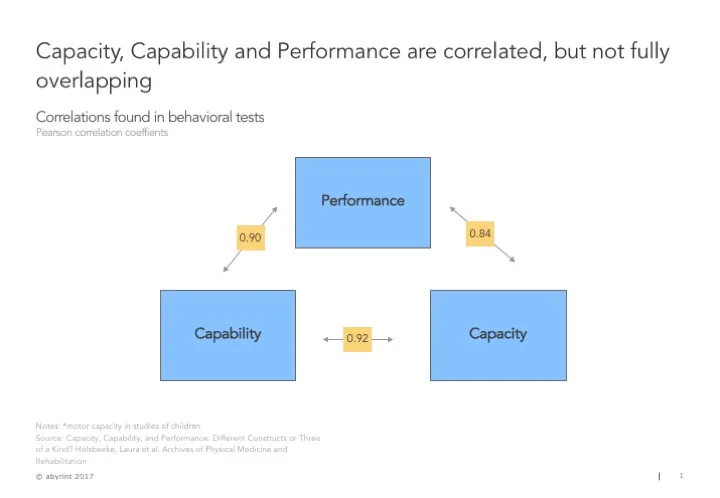Defining Institutional Metrics - Capacity, Capability, and Performance
Published on: Mon Aug 21 2017 by Ivar Strand
The words capacity, capability and performance are often used as synonyms when applied to the problem of strengthening organizations, businesses and governments. But are there important difference in between the three constructs?
Some would argue that term “capacity building” has certainly won the popularity contest as compared to usage of the word “capability”. Especially in the aid financed development world. In business, it is perhaps more common to talk about “performance”.
Does this indicate a difference in meaning? Or are these words used practically as synonyms? And is this important for how we think about supporting the strengthening of institutions?
Scientific definitions of capacity, capability and performance
In behavioral sciences there is a difference between the concepts. As most scientific knowledge on people and organizations have their roots in core behavioral sciences, we turn, for a moment, to medicine and psychology.
An helpful classification often found in literature on medical and psychological tests (i). For example, in this study on children with disabilities:
- “Capacity” refers to what a person can do in a standardized, controlled environment.
- “Capability” refers to what a person can do in his or her daily environment; and
- “Performance” refers to what the person actually does in his or hers daily environment.
Relationship between capacity, capability and performance
Turns out that the three concepts are highly correlated, but not exactly. Thus, people with high capacities are likely to have higher capability, and to perform better, compared to those with less capacities. But, for two people of equal capacity, their performance may be different.
The key difference then has to do with context. There are factors in the context that impacts how people with otherwise equal capacities actually perform. As such, the construct of capacity has little context. Capability refers to context specific situations, while “performance” is highly contextual.
Exhibit: Correlations of capacity, capability and performance

Capacity, Capability and Performance are three related constructs.
However, when applied rigorously, the three terms can explain three different phenomenons.
They are correlated, but not fully overlapping.

Relevance for capacity building programs
Translating this to the worlds of organizations and change management problems, we can suggest the following:
- Capacity could refer to i.e general and not highly context specific resources, such as having educated staff, access to basic infrastructure and communications.
- Capability could refer to specific organizational attributes, i.e does the government have a financial management information system?
- Performance can refer to how the financial management system is actually used and what is accomplished.
Ultimately, performance and results are interesting for us. This describes what an organization actually accomplishes. Capacity and capability are important insofar as they influence performance. And importantly, capability may also influence future performance, and the ability to change and strengthen over time.
The take-away is that generic capacity is important, but specific capability is even more important for an organization.
So, when thinking about capacity building for a fragile state government, it can be helpful to consider whether the program should focus on capacity, capability or performance.
For example:
- Capacity building programs can be focused on generic skills and qualifications i.e. programs to tran government staff in global and standard practices for a particular Ministry. While such training may have some context specificity, i.e training in traditional accounting principles, the training may also be quite generic and as such, expected to have less impact on performance.
- Other capacity programs may focus on i.e on-the job training. This is more context-specific, and importantly, more closely related to performance and results.
- Programs with very high context specificity can be expected to have an higher impact on performance. I.e. programs focusing on establishing core organizational systems, work processes etc, and also working with staff in implementing and performance of those systems. Such programs are possibly not as common, as they also require much in-depth context understanding to formulate and manage.
- Performance oriented approaches, i.e benchmarking, value chain, LEAN, etc can of course lead to a change of action and outcome, but the root causes of problems in performance, may often have to do with weak capabilities. Indeed, many “performance improvement” programs frequently focus on addressing improvements in capability to help ensure that performance improvements are sustainable over time.
Pleased to discuss
By Ivar Strand. Managing Partner @abyrint
(i) Capacity, Capability, and Performance: Different Constructs or Three of a Kind? Holsbeeke, Laura et al. Archives of Physical Medicine and Rehabilitation , Volume 90 , Issue 5 , 849 – 855



